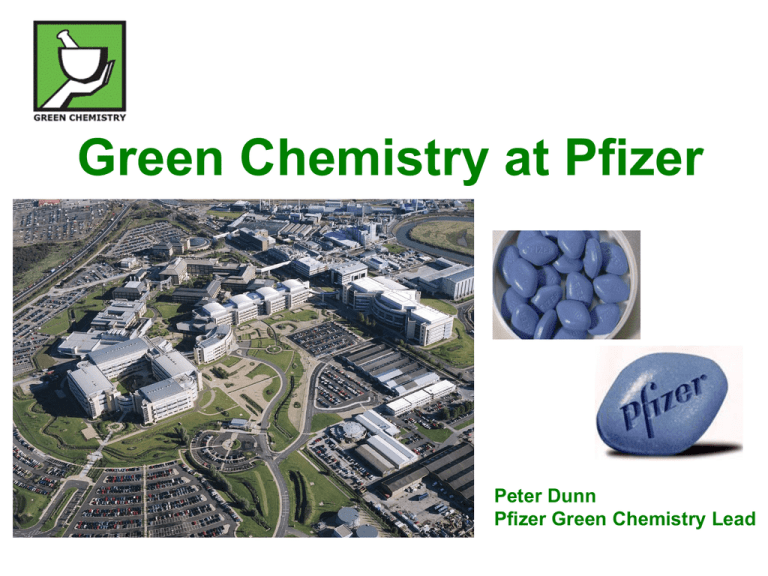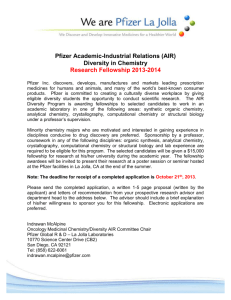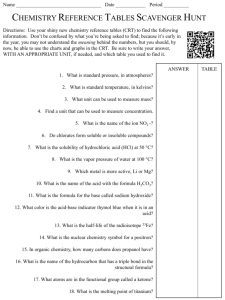ispe office space analysis - Pharmaceutical Manufacturing
advertisement

Green Chemistry at Pfizer Peter Dunn Pfizer Green Chemistry Lead Agenda Introduction to Green Chemistry at Pfizer What it is, what it encompasses Making a Difference through Green Chemistry Engagement and alignment across the company Internal tools – helping chemists “go green” -- solvent guides, reagent guide, acid/base guide, metrics tool. Education Supporting and influencing academic research Results Solvent reduction program across our Research Division Pregabalin (Lyrica®) Process Development Program Atorvastatin (Lipitor®) Process Development Program Future Directions Pfizer Green Chemistry Mission To introduce, educate and promote application of Green Chemistry across Pfizer. Key Philosophy: Voluntary restraint is better than enforced constraint. Green Chemistry includes protection of the environment and worker safety. Informing and influencing the Green Chemistry research agenda. Pfizer Green Chemistry – Engagement & Alignment Success required attention to Green Chemistry across all our locations: research, scale-up, and manufacturing facilities. We have: A full-time GC leader with a company-wide responsibility A company GC Policy and Steering Committee (responsible for the strategic plan, communications plans, key policy decisions, and monitoring of performance). Research site GC teams – Medicinal Chemists, Process Chemists and EHS colleagues, set annual objectives, manage site-based awards programs, raise awareness, and drive behavior change. Integrated GC into our co-development process with manufacturing and initiated Manufacturing GC Awards. Use of Internal Tools – Med. Chem. Solvent Selection Guide Preferred Usable Undesirable Water Acetone Ethanol 2-Propanol 1-Propanol Ethyl Acetate Isopropyl acetate Methanol MEK 1-Butanol t-Butanol Cyclohexane Heptane Toluene Methylcyclohexane TBME Isooctane Acetonitrile 2-MeTHF THF Xylenes DMSO Acetic Acid Ethylene Glycol Pentane Hexane(s) Di-isopropyl ether Diethyl ether Dichloromethane Dichloroethane Chloroform NMP DMF Pyridine DMAc Dioxane Dimethoxyethane Benzene Carbon tetrachloride Solvent Replacement Table Red Solvents Alternative Pentane Heptane Hexane(s) Heptane Di-isopropyl ether or ether 2-MeTHF or t-Butyl methyl ether Dioxane or dimethoxyethane 2-MeTHF or t-Butyl methyl ether Chloroform, dichloroethane or carbon tetrachloride DCM DMF NMP or DMAc Acetonitrile Pyridine Et3N (if pyridine used as base) DCM (extractions) EtOAc, MTBE, toluene, 2-MeTHF DCM (chromatography) EtOAc / Heptanes Benzene Toluene Pfizer Green Chemistry Results – Some Examples Combined Groton, Sandwich and La Jolla DCM use 2004 - 2007 140 120.4 DCM use per year in tonnes 120 93.5 100 80 58.0 60 51.7 40 20 0 2004 2005 2006 Year 2007 Pfizer Solvent Switching Program PGRD Global Diisopropylether Use Isopropylether (IPE) Use/lbs/year 25000 20771 20000 15000 10000 6243 5000 666 108 0 2004 2005 2006 Year 2007 Reagent Selection Guide Scalability Wide Utility Availability, Lack of Major Thermal or Tox Hazards. As Judged by API-Supply Chain The ability of a reagent to work On a wide variety of drug like Molecules. As judged by experienced medicinal chemists "Greenness" Criteria clearly laid out For each transformation Reagent Selection Guide Scalability Wide Utility Availability, Lack of Major Thermal or Tox Hazards. As Judged by API-Supply Chain The ability of a reagent to work On a wide variety of drug like Molecules. As judged by experienced medicinal chemists "Greenness" Criteria clearly laid out For each transformation Example: Oxidation of Primary Alcohol to Aldehyde Wide Utility Scalability PCC PDC References for Reagents without links CrO3 DMSO/oxalyl chloride (Swern) DMSO/TFAA Dess-Martin periodinane DMSO/SO3-py Me2S/Cl2 (CoreyKim) NiO2 BaMnO4 MnO2 TEMPO/tcca TPAP/NMO PIPO/NaOCl DMSO/DCC (Pfitzner-Moffatt) TEMPO/NaOCl Cl2/py NaOCl/RuO2 Air/TEMPO/water Air/metal(cat) Air/TEMPO/metal(cat) An excellent review covering the Green aspects of alcohol oxidations can be found in 2006 Ang Chem Int 3206 Green Criteria for this Transformation In addition 2005JOC729 pulls together a well organised collection of key references for various air oxidation of alcohols "Greeness" Green Chemistry - Pfizer’s Support and Influence on Academic Research Membership in the ACS GCI Pharmaceutical Roundtable Let Academics and Govt agencies know of some of the key challenges in Pharmaceutical Manufacturing so they can be addressed (see P.J. Dunn et al., Green Chemistry, 2007, 9, 411420) Inform research community, encourage funding agencies. Selectively fund key research areas (examples include:) Amide formation with high economy Amide reduction (through the Roundtable) Oxidations without chlorinated solvents Suzuki reactions without halogenation (through the Roundtable) Solvent recovery using membrane technology Pfizer Green Chemistry - Education Pfizer believes education is a key to changing behaviors – of present colleagues and future scientists We … Hold GC seminars at all our research sites - by chemists for chemists with prominent chemistry speakers Hold GC workshops for university students (St Louis, Connecticut, Puerto-Rico, Ireland, UK) Have worked with educational partners to develop a middle school green chemistry (sustainability) curriculum: http://grogrdapp66.pfizer.com:8080/ram/temp_files/2007/GreenChemistry_6-12-07.asx Pfizer Green Chemistry Results – External Recognition Institute of Chemical Engineers (IChemE)- AstraZeneca Award “ Excellence in Green Chemistry and Engineering Award” (2006) For Lyrica® revised synthesis – significant reductions in waste by using a enzymatic process, and performing all reaction steps in water UK Institute of Chemical Engineers (IChemE) “Crystal Faraday Award for Green Chemical Technology" (2003) For process redesign of Viagra® (sildenafil citrate) – “Sets a new benchmark standard for minimising solvent use in Pharmaceutical Manufacturing” U.S. Environmental Protection Agency (EPA) “Presidential Green Chemistry Award” (2002) Revised manufacturing process for Zoloft® (sertraline hydrochloride) doubled product yield, and significantly reduced environmental impacts (use of resources, waste minimization) Green Chemistry in Process Dev. Pregabalin (Lyrica®) is a Drug for the treatment of Neuropathic Pain Launched in the US in September 2005 Sales $1.16 billion (2006), $1.8 billion (2007) Medicinal Chemistry Pregabalin Synthesis 10 steps, 33% overall yield Cost was 6x target Silverman et al. Synthesis, 1989, 953. (racemic synthesis) Yuan et al., Biorg. Med. Chem. Lett., 1991, 34, 2295 (chiral synthesis shown on slide). Pregabalin (Lyrica®) Launch Process CN NH2 CHO EtO2C CO2Et CO2H (S)-Mandelic acid NH2 Efficient synthesis of racemic Pregabalin Final Step Classical Resolution CO2H 25-29 % overall Wrong enantiomer difficult to recycle E-Factor 86 Chemistry Published (Org. Process R and D, 1997, 1, 26) > 99.5 % ee Asymmetric Hydrogenation Route OCO2Et CN Pd(OAc)2, PPh3 CN CHO + CN CO2t-BuNH3 CN CO (300psi) 1% (Me-DuPHOS)-Rh 0.05% mol 45 psi, 18h CO2Et CN NH2 CO2-t-BuNH3+ 97.7% ee Higher yield (42% overall) Original Catalyst (Me-DuPHOS-Rh, S/C ratio 2700) Licensed chiral ligand expensive In-house chiral ligand developed – to give lower costs Much improved environmental profile but similar cost to resolution route. Chemistry Published (2004JACS5966) (2003JOC5731) CO2H 61% (42% overall) 99.8% BF4Rh P P (S)-[Rh-Trichickenfootphos] Enzymatic Resolution of CNDE (CH3)2CHCH2 EtO2C CN Enzyme Water pH = 7 CO2Et 25oC (CH3)2CHCH2 CN (CH3)2CHCH2 + EtO2C Racemic Diester CO2Et R-Diester Organic Soluble _ O2C CO2Et S-Monoester Water Soluble Enzymatic hydrolysis of Cyano diester enabled early resolution of chiral center Enzyme screen revealed 2 (S)-selective hits with E>200: Thermomyces lanuginosus lipase (Novozymes) Rhizopus delemar lipase (Amano) CN Biocatalytic Kinetic Resolution Route CN recycling of R-1 NaOEt, 100% EtO2C R-1, 85 % ee CN EtO2C + CO2Et racemic CNDE 1 765g/L of total volume (3.25 Kg/L of H2O) CO2Et CN H2O Lipolase - O2C CO2Et (S)- CNDE acid Step 1 CN H2O CO2Et Step 2 >98 % ee @ 45% conversion (S)- CNE 85-90% Biocatalytic with low (~0.8%) protein loading Resolution at first step (wrong enantiomer can be recycled) High throughput; simple operations All 4 reactions conducted in water Enzymatic Step scaled up to 10, 000 Kg scale E-Factor improved from 86 to 17 H2, Ni H2O Step 3 NH2 CO2H Pregabalin 90-95% 99% purity, >99.7% ee overall 40-45% yields after one recycling Comparison of Pregabalin Processes Table 1. Inputs for 1000 kg Pregabalin via 1st Generation and New Routes Kilograms Inputs 1st Generation Route New Route CNDE 6212 4798 Enzyme 0 574 (S)-Mandelic acid 1135 0 Raney nickel 531 80 Solvents Total 50042 57920 6230 11682 Chemoenzymatic route uses >5x less inputs than 1st generation route Pregabalin Synthetic Improvements By replacing all reaction solvents with water, bringing the Resolution to the beginning, and the Raney nickel reduction to the end, the proposed improvements will yield annual improvements of: Starting material usage reduction of 800 tons Solvent reductions: Methanol 1 million gallons Ethanol 0.4 million gallons Tetrahydrofuran 2.2 million gallons Isopropanol 2 million gallons Mandelic Acid usage eliminated – 500 tons Energy use reduced by 83 % Pregabalin Summary Launched in the US in September 2005 Treatment of Neuropathic pain Sales in 2006 $ 1.16 billion Sales in 2007 $ 1.8 billion New enzymatic chemistry successfully scaled up to 10 tonnes scale. Process was switched to the enzymatic route in 3Q2006 By making the switch to optimal route very early in the product lifetime, Pfizer ensures close to maximum benefits to the environment. Chemistry has been published Martinez et al. (OPRD, 2008, 11, 392). In 2006 Pfizer received the AstraZeneca Award for Excellence in Green Chemistry and Engineering for its work on Pregabalin. New Process for Atorvastatin (Lipitor®) OH O OH O O OH NC OH O NC O O NC O hydroxyketone hydroxynitrile cis diol O N H OH N O O O OH O NC O OH TBIN F Atorvastatin The reduction of hydroxyketone to cis diol is a key step that sets the stereochemistry for atorvastatin. This step has now been converted from a chemical reduction to a biocatalytic reduction Comparison of Chemical and Biocatalytic Reactions OH NC O Chemical Route NaBH4 Et3B THF/MeOH/HOAc cryogenic temp O O OH NC Biocatalytic Route enzyme aqueous buffer ambient temperature OH O O Chemical process is slow: 80 hours for 6 x methanol distillations to remove the boron based waste. Enzymatic reaction takes <24 hours with a relatively simple work-up. Quality: Enzymes are highly selective, giving improved cis: trans ratio. Triethyl Borane: pyrophoric and toxic NaBH4: Safety hazard. H2 source. Multiple solvents and low temperature requirement eliminated Co-factor Recycling Systems Substrate Coupled Co-factor Regeneration OH O O NC OH OH O NC O O ketoester cis diol NADH alcohol + dehydrogenase NAD isopropanol acetone Enzyme Coupled Co-factor Regeneration OH O O NC OH OH O alcohol dehydrogenase O NC O ketoester cis diol NADPH NADP+ glucose gluconic acid glucose dehydrogenase Co-factor Recycling Systems Substrate Coupled Co-factor Regeneration OH O O NC OH OH O NC O O ketoester cis diol NADH alcohol + dehydrogenase NAD isopropanol acetone Enzyme Coupled Co-factor Regeneration OH O O NC OH OH O alcohol dehydrogenase O NC O ketoester cis diol NADPH NADP+ glucose gluconic acid glucose dehydrogenase High Levels of Aqueous Waste Co-factor Recycling Systems Substrate Coupled Co-factor Regeneration OH O O NC OH OH O NC O O ketoester cis diol NADH alcohol + dehydrogenase NAD Greener Option isopropanol acetone Enzyme Coupled Co-factor Regeneration OH O O NC OH OH O alcohol dehydrogenase O NC O ketoester cis diol NADPH NADP+ glucose gluconic acid glucose dehydrogenase High Levels of Aqueous Waste Environmental Benefits Chemical 6000000 5000000 Lt/ year 4000000 Enzymatic 3000000 Chemical Enzymatic 2000000 1000000 0 Aqueous Waste Organic Waste The total organic waste for the reduction step will be reduced by 3.4 million L / annum (65% reduction) Liquid Nitrogen usage of 3 million L / annum is eliminated Large Savings in energy use and processing time. Where do we go from here ? Aggressively pursue ultra low E-Factors for our high volume products (especially Celebrex®, Lyrica®, Atorvastatin®). Use a Metrics based system so that all new commercial products meet a good “dignity level” of environmental performance. Continue our successful work in minimising the environmental footprint to discover drugs. Continue with our external education work promoting Green Chemistry. Thanks and Acknowledgment Pregabalin Enzyme Chemistry –C. Martinez, S. Hu, J, Tao, P. Kellerher Asymmetric Hydrogenation – G. Hoge, W. Kissel Energy Calculations – Kevin Hettenbach Lipitor D. Bauer, M. Burns, A. Denhole, A. Fahy, C. Healy, O’Shaughnessy, E, Maitiu, F. Stomeo, G. Wittaker, J. Wong IEP, (Wiesbarden, Germany) 60 members of the Pfizer Green Chemistry teams To our partners in education and research To YOU – today’s audience!




